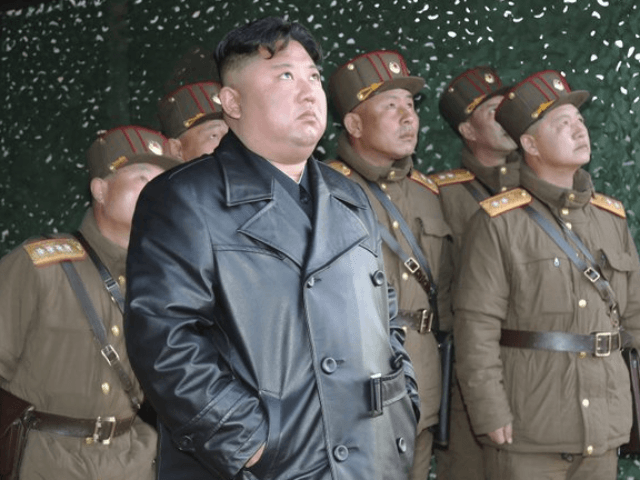North Korea boosted its public health spending by 7.4 percent and published assurances of hygiene protocol at government facilities in state media on Monday, once again giving no indication it had identified any coronavirus cases.
North Korea claims at press time zero confirmed cases of the Chinese coronavirus, a pathogen currently fueling a pandemic that has hit the three states that border North Korea – China, South Korea, and Russia – with particular aggression. North Korea reportedly shut its borders to foreigners early this year, but it has not indicated it has imposed the sort of quarantine and shelter-in-place measures common in the rest of the world.
The World Health Organization (WHO), which spread false Chinese Communist Party (CCP) propaganda claiming that the coronavirus did not spread from human to human, has said it does not have evidence contradicting North Korea’s claim of zero cases.
Pyongyang held a regular meeting of its Supreme People’s Assembly (SPA), its rubber-stamp legislature, on Sunday, in which it announced a significant realignment of the nation’s budget towards public health. The meeting would have required hundreds of communist officials to meet indoors, a potential hazard for spreading the highly contagious Chinese coronavirus.
According to the South Korean newswire service Yonhap, the lawmakers agreed to allocate another 7.4 percent of the budget towards public health initiatives, including the construction of new health facilities.
“The North also appears to have shifted the focus of its construction projects from developing tourist sites, such as the Wonsan-Kalma coastal tourist area and Samjiyon urban township, to building health and energy-related facilities,” Yonhap noted, “including the Pyongyang General Hospital, according to the state-run Institute for National Security Strategy (INSS).”
“Funds needed for pushing forward key construction projects whose completion is due by this year including Pyongyang General Hospital and installation of an oxygen separator … are to be provided as planned,” the outlet quoted North Korea’s Korean Central News Agency (KCNA) as reporting. KCNA is a regime-run news outlet.
Unlike KCNA, the state-run Pyongyang Times put no emphasis on investments in health. Instead, the newspaper said that the Supreme People’s Assembly worked on “laws on recycling, online education and provision of living conditions for discharged officers.” It mentioned redistribution of government funds through the state budget only generally.
The legislative meeting occurred separately from a meeting Sunday of North Korea’s Politburo, reportedly presided over by dictator Kim Jong-un. During that event, Kim reportedly discussed the Chinese coronavirus specifically, claiming North Korea had a “very stable anti-epidemic situation.”
KCNA relayed that officials at the meeting deemed the virus “a great disaster threatening the whole mankind, regardless of borders and continents.”
“Such environment can become a condition creating some obstacles to our struggle and progress,” KCNA noted. The group reportedly agreed on “taking national measures for protecting the life and safety of our people to cope with the worldwide epidemic disease,” but it was not clear what those measures were.
Politburo officials reportedly appeared in the state newspaper Rodong Sinmun sitting close together and not wearing protective gear, suggesting that Kim and his top statesmen are not following social distancing guidelines.
On Monday, Rodong Sinmun ran a feature article on several “anti-epidemic centers” around the country, primarily the Haeju City Hygienic and Anti-Epidemic Center, praising its workers for keeping ports of entry sealed. Haeju is a port city on North Korea’s west coast about a two-hour drive from the capital.
“Officials and workers of the Haeju City Hygienic and Anti-epidemic Center are taking detailed measures for tightening up anti-epidemic observation on the seaside and its surroundings and rules on sea entry and exit in keeping with the characteristics of the city as a coastal region,” the newspaper reported. “They are normalizing the disinfection of public places in the city and are properly organizing the work of producing and supplying plenty of disinfectants as well.”
In Taesong district, Pyongyang, Rodong Sinmun reported that the anti-epidemic center’s officials are “engaging themselves in daily disinfection in conformity with the quarantine regulations,” suggesting that some restrictions of movement in response to the pandemic are in place.
In contrast to its own situation, North Korea’s state publications have published regular updates on the number of cases of coronavirus in South Korea.
While no confirmed numbers are available regarding any potential coronavirus cases in North Korea, some reports suggest that the nation’s military, which patrols its porous border with China, may be most vulnerable. The South Korean conservative newspaper Chosun Ilbo reported last month that some evidence suggests that over 100 North Korean soldiers have died of coronavirus. North Korea has hinted, however, that the virus has caused significant damage to its economy, as most of its profits come from Chinese tourism. China imposed strict lockdown measures on most of the country since February, months after doctors in Wuhan, where the virus originated, found evidence of a new contagious disease.
Dr. Edwin Salvador, the WHO Representative to the Democratic People’s Republic of Korea (DPRK), told reporters last week that the United Nations body believes that no coronavirus cases have occurred in North Korea.
“As of 2 April, 709 people – 11 foreigners and 698 nationals – have been tested for COVID-19. There is no report of a COVID-19 case. There are 509 people in quarantine – two foreigners and 507 nationals,” he said.

COMMENTS
Please let us know if you're having issues with commenting.